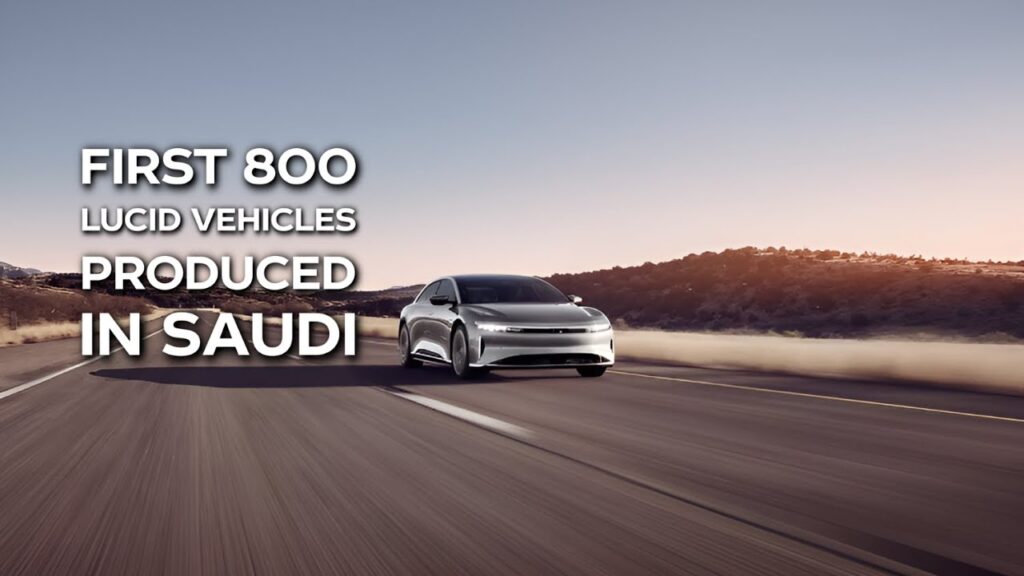Saudi Arabia has officially launched its first locally built electric vehicle (EV), marking a significant milestone in the country’s push towards a sustainable and diversified economy. The unveiling of the new EV aligns with Saudi Arabia’s Vision 2030 strategy, which aims to reduce dependence on oil, boost industrial innovation, and position the kingdom as a global leader in clean energy and advanced technology.
A Historic Step in Saudi Arabia’s Automotive Industry
The introduction of Saudi Arabia’s first homegrown EV is a game-changer for the country’s automotive industry. The vehicle, produced by Ceer Motors, a Saudi-based electric car manufacturer, is the result of a partnership between the Public Investment Fund (PIF) and global automotive and technology leaders. The company aims to manufacture high-quality, technologically advanced electric vehicles designed to compete with global brands.
Crown Prince Mohammed bin Salman emphasized the importance of this achievement, stating that the initiative will create new job opportunities, attract foreign investment, and contribute to the development of a more sustainable transportation sector in Saudi Arabia.
What Makes This EV Special?

The newly launched electric vehicle comes with cutting-edge technology and features that set it apart. Some of its key highlights include:
- Advanced Battery Technology: The vehicle is equipped with a high-performance lithium-ion battery, offering an extended driving range suitable for both urban and long-distance travel.
- Smart AI Integration: The EV includes artificial intelligence-powered features such as autonomous driving assistance, smart navigation, and real-time vehicle diagnostics.
- Fast Charging Capabilities: Owners can charge their cars quickly at designated EV charging stations across Saudi Arabia, reducing wait times significantly.
- Sleek and Modern Design: The car is built with aerodynamics in mind, ensuring maximum efficiency and performance while providing a luxurious and comfortable driving experience.
Saudi Arabia’s Vision for the EV Market
Saudi Arabia’s first electric vehicle is just the beginning of a broader vision to establish the country as a hub for electric vehicle production and innovation. The government has set ambitious goals to manufacture over 500,000 EVs per year by 2030, ensuring a shift towards a greener future.
To support this transition, the kingdom is investing in EV infrastructure, including charging stations, battery production facilities, and research centres focused on advancing electric mobility. Saudi Arabia is also exploring partnerships with international automakers to strengthen its position in the global EV industry.
Economic and Environmental Impact
The launch of Saudi Arabia’s first electric vehicle is expected to bring numerous benefits to both the economy and the environment:
- Job Creation: The EV industry is projected to generate thousands of new jobs in manufacturing, engineering, and technology sectors.
- Attracting Investment: With the support of the Public Investment Fund, Saudi Arabia is attracting global investors interested in the growing electric vehicle market.
- Reduced Carbon Emissions: The adoption of EVs will help cut down on greenhouse gas emissions, contributing to Saudi Arabia’s efforts to combat climate change.
- Energy Diversification: As a country historically reliant on oil exports, developing an EV industry allows Saudi Arabia to diversify its economy and invest in renewable energy sources.
Challenges and Future Prospects
While the launch of Saudi Arabia’s first electric vehicle is a major milestone, there are still challenges to overcome:
- Charging Infrastructure: Expanding the network of fast-charging stations nationwide remains a priority to ensure convenience for EV owners. A well-distributed network of chargers is essential for mass adoption, especially in remote areas.
- Market Competition: Competing with established global EV brands such as Tesla, BYD, and Volkswagen will require continuous technological innovation, competitive pricing, and strong brand positioning.
- Consumer Adoption: Encouraging widespread acceptance of EVs among Saudi drivers will involve incentives such as government subsidies, tax benefits, and awareness campaigns. Many consumers may be hesitant to switch due to concerns about range, battery life, and initial costs.
- Supply Chain and Local Manufacturing: Establishing a stable supply chain for critical EV components, such as batteries and semiconductors, will be crucial for sustainable production. Currently, much of the battery supply relies on imports, and developing local manufacturing capacity will take time and investment.
- Skilled Workforce Development: The EV industry demands a highly skilled workforce in engineering, software development, and manufacturing. Saudi Arabia must invest in education and training programs to prepare its labor force for jobs in this rapidly evolving sector.
- Government Policies and Regulations: Creating clear policies around EV safety standards, import regulations, and incentives will be key to fostering a healthy electric vehicle ecosystem in the kingdom. The government will need to balance regulatory oversight with market growth to encourage both consumers and investors.
- Battery Recycling and Environmental Impact: As EV adoption increases, managing battery disposal and recycling will be crucial to avoid environmental challenges. Saudi Arabia must develop sustainable battery recycling programs to handle used EV batteries efficiently and minimize waste.
Despite these challenges, Saudi Arabia is fully committed to making electric vehicles a key part of its future. The government plans to expand research and development efforts, establish more local production facilities, and introduce policies that encourage EV adoption.
Conclusion
The launch of Saudi Arabia’s first homegrown electric vehicle marks the beginning of a new era for the kingdom’s automotive industry. As part of its Vision 2030 initiative, the country is making rapid progress in developing sustainable transportation, reducing carbon emissions, and positioning itself as a leader in electric vehicle production.
With continuous investment, innovation, and government support, Saudi Arabia is set to play a crucial role in the global shift towards clean energy transportation. The unveiling of this first EV is just the start of an exciting journey toward a more sustainable and technologically advanced future.
Do follow on Instagram
Kuwait’s Vehicle Market: A Crucial Driver of Economic Growth



